新概念第二册Lesson 30 Football or Polo讲义
文档属性
| 名称 | 新概念第二册Lesson 30 Football or Polo讲义 |
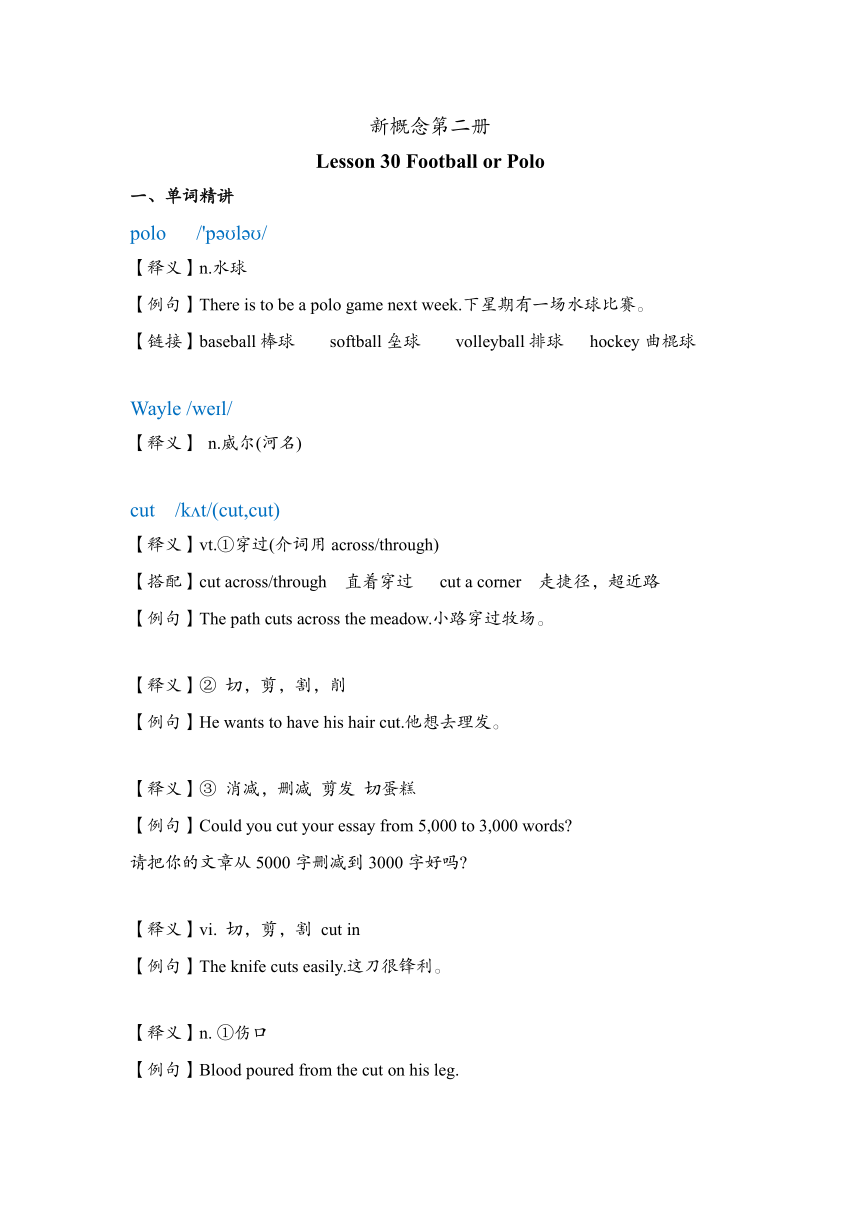
|
|
| 格式 | docx | ||
| 文件大小 | 167.1KB | ||
| 资源类型 | 教案 | ||
| 版本资源 | 新概念英语 | ||
| 科目 | 英语 | ||
| 更新时间 | 2024-11-21 00:00:00 | ||
图片预览

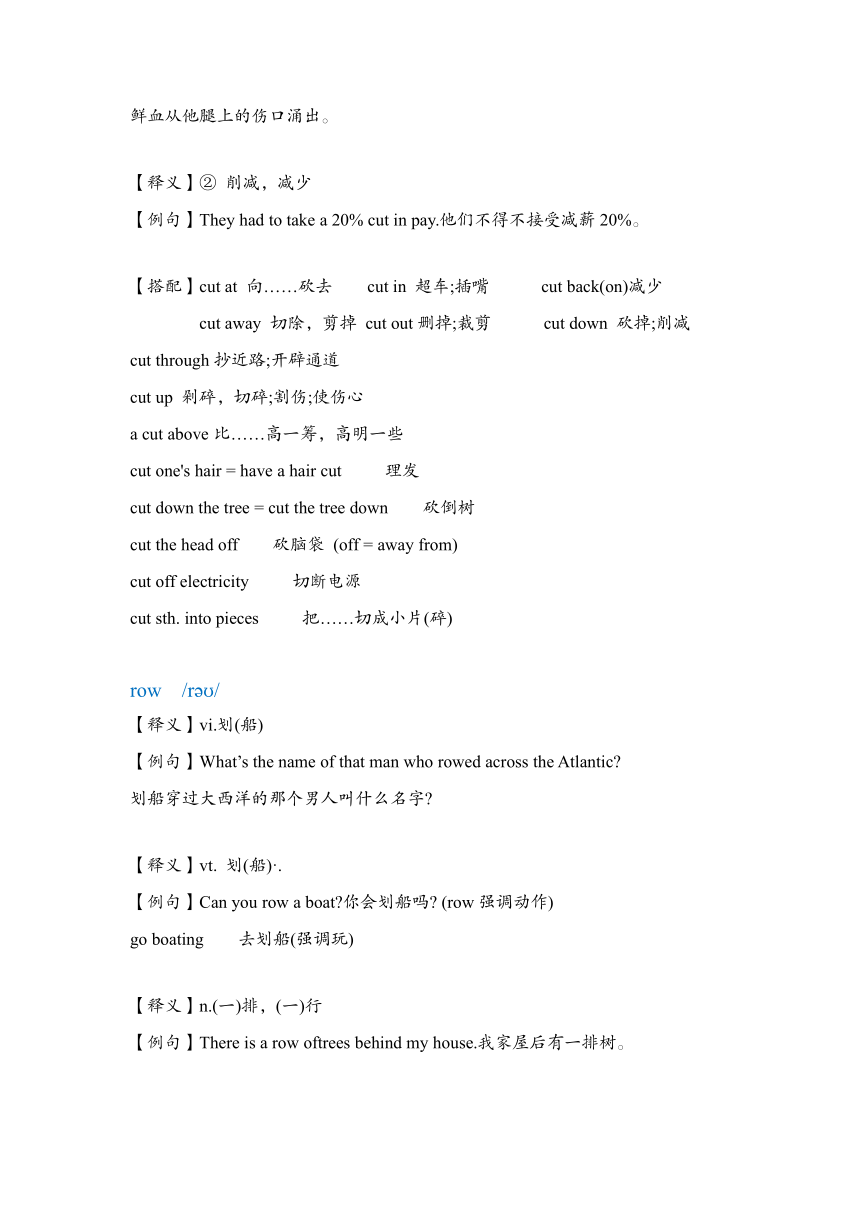
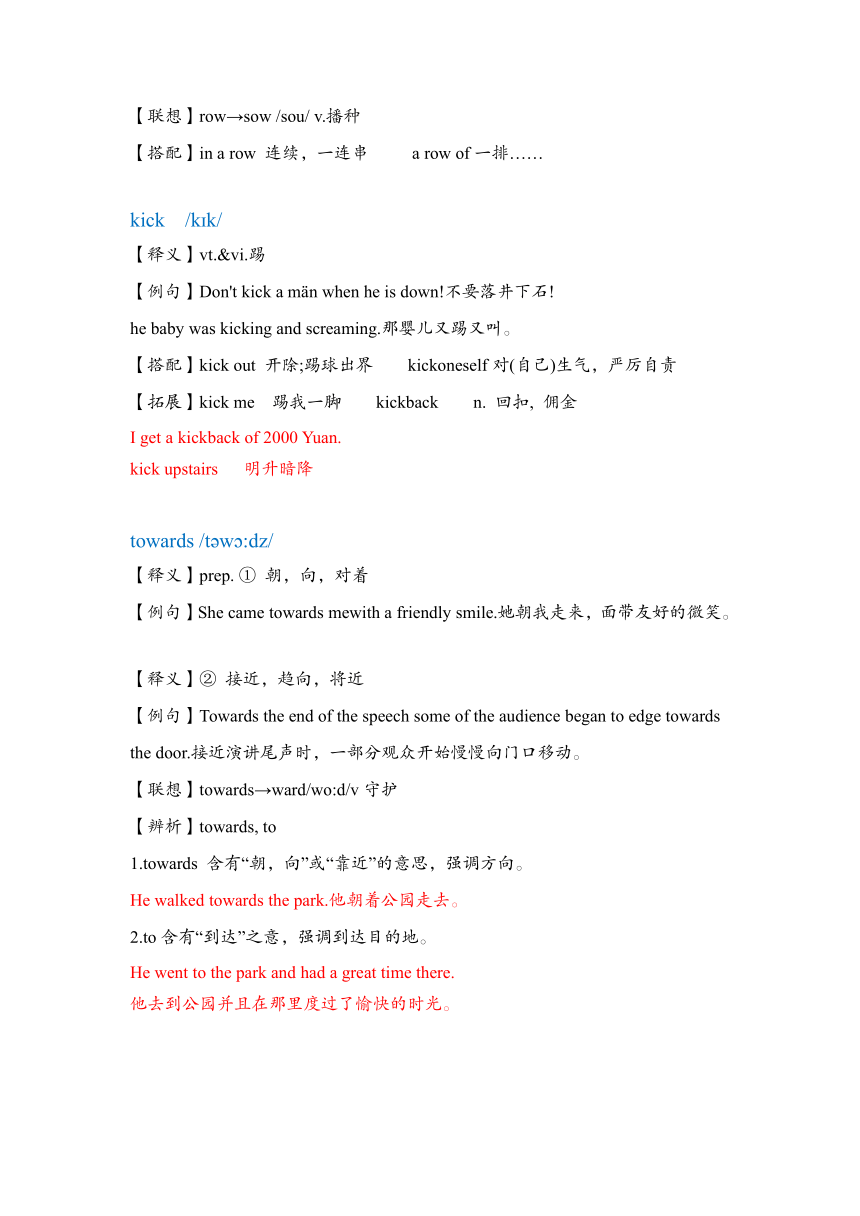
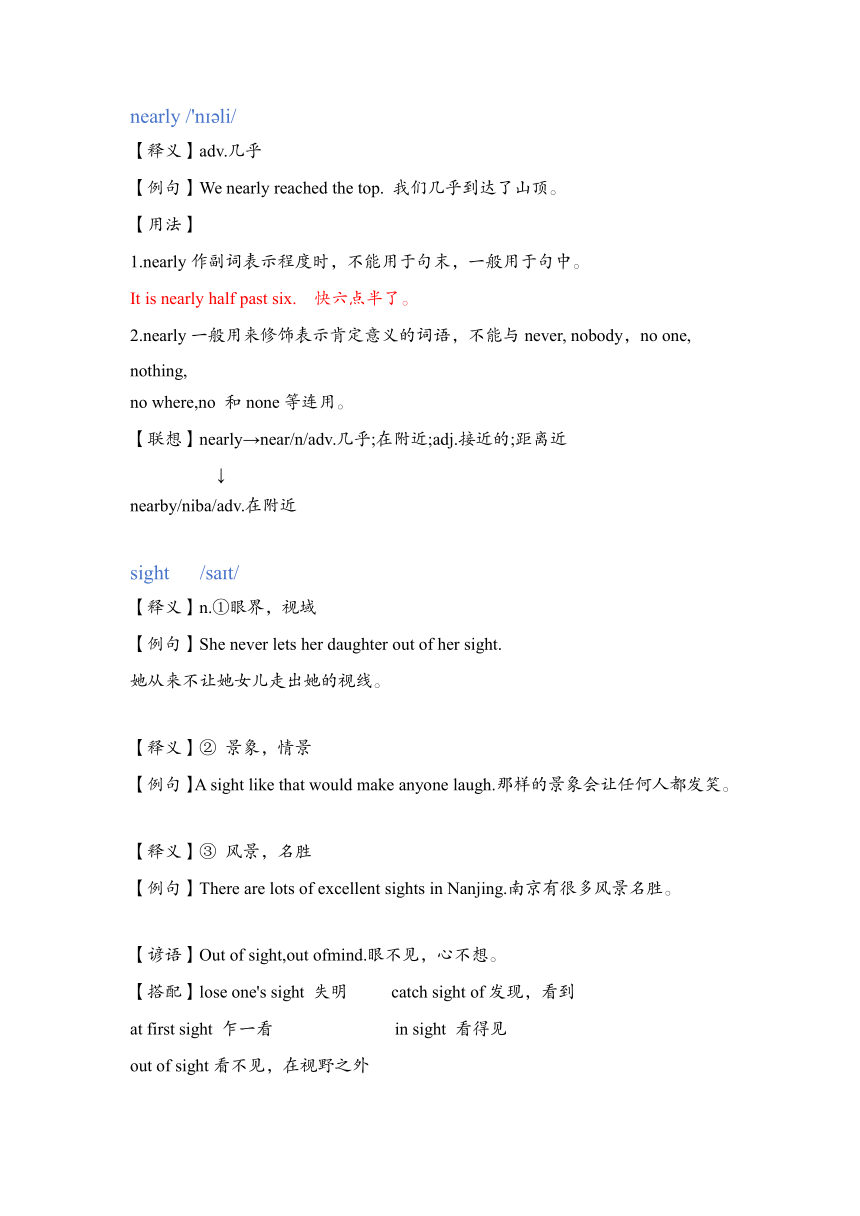
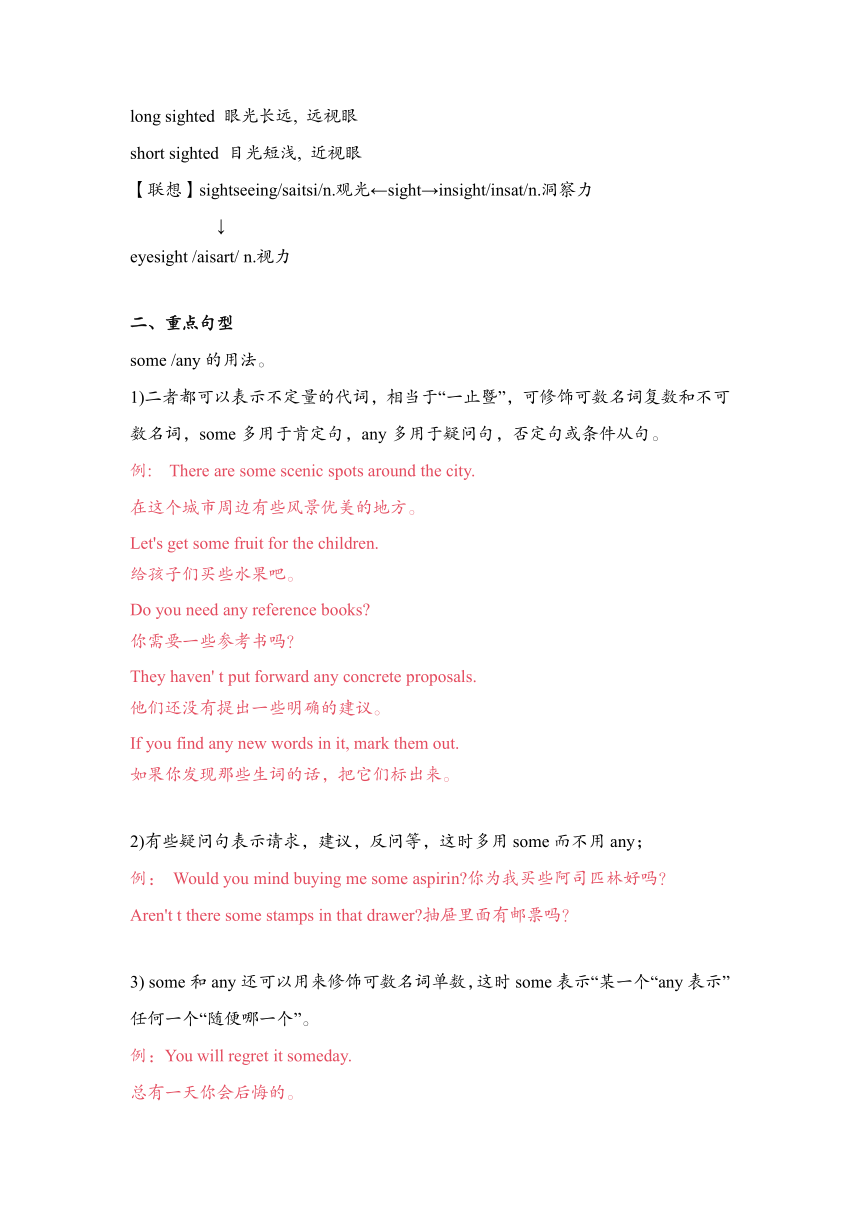
文档简介
新概念第二册
Lesson 30 Football or Polo
单词精讲
polo /'p l /
【释义】n.水球
【例句】There is to be a polo game next week.下星期有一场水球比赛。
【链接】baseball棒球 softball垒球 volleyball排球 hockey曲棍球
Wayle /we l/
【释义】 n.威尔(河名)
cut /k t/(cut,cut)
【释义】vt.①穿过(介词用across/through)
【搭配】cut across/through 直着穿过 cut a corner 走捷径,超近路
【例句】The path cuts across the meadow.小路穿过牧场。
【释义】② 切,剪,割,削
【例句】He wants to have his hair cut.他想去理发。
【释义】③ 消减,删减 剪发 切蛋糕
【例句】Could you cut your essay from 5,000 to 3,000 words
请把你的文章从5000字删减到3000字好吗
【释义】vi. 切,剪,割 cut in
【例句】The knife cuts easily.这刀很锋利。
【释义】n. ①伤口
【例句】Blood poured from the cut on his leg.
鲜血从他腿上的伤口涌出。
【释义】② 削减,减少
【例句】They had to take a 20% cut in pay.他们不得不接受减薪20%。
【搭配】cut at 向……砍去 cut in 超车;插嘴 cut back(on)减少
cut away 切除,剪掉 cut out删掉;裁剪 cut down 砍掉;削减
cut through抄近路;开辟通道
cut up 剁碎,切碎;割伤;使伤心
a cut above比……高一筹,高明一些
cut one's hair = have a hair cut 理发
cut down the tree = cut the tree down 砍倒树
cut the head off 砍脑袋 (off = away from)
cut off electricity 切断电源
cut sth. into pieces 把……切成小片(碎)
row /r /
【释义】vi.划(船)
【例句】What’s the name of that man who rowed across the Atlantic
划船穿过大西洋的那个男人叫什么名字
【释义】vt. 划(船)·.
【例句】Can you row a boat 你会划船吗 (row强调动作)
go boating 去划船(强调玩)
【释义】n.(一)排,(一)行
【例句】There is a row oftrees behind my house.我家屋后有一排树。
【联想】row→sow /sou/ v.播种
【搭配】in a row 连续,一连串 a row of一排……
kick /k k/
【释义】vt.&vi.踢
【例句】Don't kick a m n when he is down!不要落井下石!
he baby was kicking and screaming.那婴儿又踢又叫。
【搭配】kick out 开除;踢球出界 kickoneself对(自己)生气,严厉自责
【拓展】kick me 踢我一脚 kickback n. 回扣, 佣金
I get a kickback of 2000 Yuan.
kick upstairs 明升暗降
towards /t w :dz/
【释义】prep. ① 朝,向,对着
【例句】She came towards mewith a friendly smile.她朝我走来,面带友好的微笑。
【释义】② 接近,趋向,将近
【例句】Towards the end of the speech some of the audience began to edge towards the door.接近演讲尾声时,一部分观众开始慢慢向门口移动。
【联想】towards→ward/wo:d/v守护
【辨析】towards, to
1.towards 含有“朝,向”或“靠近”的意思,强调方向。
He walked towards the park.他朝着公园走去。
2.to含有“到达”之意,强调到达目的地。
He went to the park and had a great time there.
他去到公园并且在那里度过了愉快的时光。
nearly /'n li/
【释义】adv.几乎
【例句】We nearly reached the top. 我们几乎到达了山顶。
【用法】
1.nearly作副词表示程度时,不能用于句末,一般用于句中。
It is nearly half past six. 快六点半了。
2.nearly一般用来修饰表示肯定意义的词语,不能与never, nobody,no one, nothing,
no where,no 和none等连用。
【联想】nearly→near/n/adv.几乎;在附近;adj.接近的;距离近
↓
nearby/niba/adv.在附近
sight /sa t/
【释义】n.①眼界,视域
【例句】She never lets her daughter out of her sight.
她从来不让她女儿走出她的视线。
【释义】② 景象,情景
【例句】A sight like that would make anyone laugh.那样的景象会让任何人都发笑。
【释义】③ 风景,名胜
【例句】There are lots of excellent sights in Nanjing.南京有很多风景名胜。
【谚语】Out of sight,out ofmind.眼不见,心不想。
【搭配】lose one's sight 失明 catch sight of发现,看到
at first sight 乍一看 in sight 看得见
out of sight看不见,在视野之外
long sighted 眼光长远, 远视眼
short sighted 目光短浅, 近视眼
【联想】sightseeing/saitsi/n.观光←sight→insight/insat/n.洞察力
↓
eyesight /aisart/ n.视力
重点句型
some /any的用法。
1)二者都可以表示不定量的代词,相当于“一止暨”,可修饰可数名词复数和不可数名词,some多用于肯定句,any多用于疑问句,否定句或条件从句。
例: There are some scenic spots around the city.
在这个城市周边有些风景优美的地方。
Let's get some fruit for the children.
给孩子们买些水果吧。
Do you need any reference books
你需要一些参考书吗?
They haven' t put forward any concrete proposals.
他们还没有提出一些明确的建议。
If you find any new words in it, mark them out.
如果你发现那些生词的话,把它们标出来。
2)有些疑问句表示请求,建议,反问等,这时多用some而不用any;
例: Would you mind buying me some aspirin 你为我买些阿司匹林好吗?
Aren't t there some stamps in that drawer 抽屉里面有邮票吗?
3) some和any还可以用来修饰可数名词单数,这时some表示“某一个“any表示”任何一个“随便哪一个”。
例:You will regret it someday.
总有一天你会后悔的。
You can get it in any department store.
你在任何一个百货商店都可以买到。
2. 冠词the的用法
1)在人名和地名前不加冠词a或the
例: John lives in England. He has a house in London.
2)在海洋,河流,山脉前,一定要用定冠词the
例: Who was the first person to sail across the Pacific
谁是第一个横渡太平洋的人呢?
It can get rough in the Mediterranean (地中海)。
地中海可能很不平静
Many great cities are built on rivers: Paris is on the Seine, London is on the Thames and Rome is on the Tiber.很多大城市建在河岸上,巴黎在桑纳河上,伦敦在泰晤士河上,罗马在地波河上。
I know a man who has been on climbing expeditions in many parts of the world. He has climbed in the Alps, the Himalayas, and the Rocky Mountains.
我认识一个参加过世界各地登山探险的人,他曾攀登过阿尔卑斯山脉,喜马拉雅山山脉以及落基山。
3)由普通名词构成的专有名词前加the。
America-the Unite States of America
China- the People' s Republic of China
the Great Wall , the Summer Palace, the Forbidden City
4)表示特定的或上文提到过的事物(或双方都明了的事物)前加the。
例:I am interested in the film. 我对这部电影感兴趣。
Pass me the slippers please. 请把拖鞋递给我。
5)世界上独一无二的事物前加the the earth the moon the sun
6)在序数词或形容词的高级前加the
the second storey二层楼
the largest room最大的房间
7)在方位词前面加the
on the left
on the right
in the east
in the west
8)在表示时间的一些固定短语前加the
in the morning in the afternoon
in the evening in the day time
9)the放在形容词前表一类人
the poor the rich the old the young the sick the new the blind
10) 在姓氏复数形式前,表示一家人或夫妇俩。
the Whites; the Browns; the Tuners
11)在乐器前加the
the piano; the guitar; the saxophone
12)表世纪的某个年代
in the 1980' s
13)在发明物的前加the
例: The telephone was invented by Bell.电话是由贝尔发明的。
The' compass was invented in China. 指南针是中国发明的
不加冠词的时候:
1)专有名词,物质名词,抽象名词,人名,地名前不加冠词,
China London America Smith Art matter
2)季节,月份,星期,节假日,一日三餐,前不加冠词
March May National' s day Valentine
Children' s day Supper Spring Saturday
3)学科名称,球类,棋类名词前不加冠词
mathematics politics football basketball chess
课文精讲
The Wayle is a small river that cuts across the park near my home.
威尔河是横穿过我家附近公园的一条小河。
river n. 河 江 ; sea 海 , lake 湖 , stream 小河 = brook, spring 泉 ; park n. 公园 ; ★人名及地名前不加冠词 a/an/the, 但在海洋 河流 山脉 , 及
部分国名前一定要加冠词 the; cut-cut-cut v. 切,引处意为穿过;across prep. 横穿过 ; that 引导定语从句修饰 river;
I like sitting by the Wayle on fine afternoons.
我喜欢在天气晴朗的下午到河边坐坐。
★like doing 习惯性动作;
like to do 一次性地;
afternoon +s 表示“每逢”on Mondays ;
on morning/afternoon/evening;
by prep. 在 ... 旁边
It was warm last Sunday, so I went and sat on the river bank as usual.
上星期日天气很暖和。于是我和往常一样,又去河边坐着。
warm n. 温暖的 warmth n. 温暖 热情 ; sit-sat-sat v. 坐 ; bank n. 河岸 银行 v. 存钱 bank on 依靠 = rely on; as usual 像往常一样;
Some children were playing games on the bank and there were some people rowing on the river
河岸上有些孩子正在玩耍,河面上有些人正在划船。
play v. 玩;player n. 玩家 ; game n. 游戏 ; row v. 划船 ( 强调动作 ); go boating 去划船,强调玩;rowing 现在分词修饰 people 作定语 ;
★ there be + sb. + doing 某处有某人正在做某事 : There were some people who were rowing on the river.
Suddenly, one of the children kicked a ball very hard and it went towards a passing boat.
突然,一个孩子狠狠地踢了一脚球,球便向着一只划过来的小船飞去。
kick v. 踢 ; ball n. 球 ; very hard 重重地踢出去;towards prep. 朝 向,并且越来越近;passing boat = boat that is passing.
Some people on the bank called out to the man in the boat, but he did not hear them.
岸上的一些人对着小船上的人高喊,但他没有听见。
call out to 对 ... 高喊 = shout at; hear-heard-heard v. 听见 ;
The ball struck him so hard that he nearly fell into the water.
球重重地打在他身上,使他差点儿落入水中。
strike-struck-tricken v. n. 击 打 ; nearly adv. 几乎 差点儿 = almost ;fall- fell- fallen v. 落下;
★ so + 形容词 + that 从句 : 如此……以致于……” = such + 名词 + that 从句:
It was such a heavy strike that he nearly fell into the water.
I turned to look at the children, but there weren't any in sight: they had all run away!
我转过头去看那些孩子,但一个也不见,全都跑了!
turn to 转过头去;sight n. 眼界 视域 ≠ in sight 可以看到 out of sight 看不到;
★ some 用于肯定句或表示征求他人意见的句子中 , any 用于否定句和疑问句中 ; run-ran-run v. 跑 ; run away 逃跑 跑掉 ; run into 碰上 ; run out 用光 ; run over 轧过 演练 ;
The man laughed when he realized what had happened.
当那个人明白了发生的事情时,笑了起来。
laugh v. 笑 laugh at 嘲笑 ; laughter n. 笑 ; realize v. 领悟 理解 认识到 实现 ;
realization n. 认识 领会 领悟 ;
realizable adj. 可实现的 可行的 ;
He called out to the children and threw the ball back to the bank.
他大声叫着那些孩子,把球扔回到岸上。
throw-threw-thrown v. 扔 丢;call out to 对 ... 高喊 = shout at;
Lesson 30 Football or Polo
单词精讲
polo /'p l /
【释义】n.水球
【例句】There is to be a polo game next week.下星期有一场水球比赛。
【链接】baseball棒球 softball垒球 volleyball排球 hockey曲棍球
Wayle /we l/
【释义】 n.威尔(河名)
cut /k t/(cut,cut)
【释义】vt.①穿过(介词用across/through)
【搭配】cut across/through 直着穿过 cut a corner 走捷径,超近路
【例句】The path cuts across the meadow.小路穿过牧场。
【释义】② 切,剪,割,削
【例句】He wants to have his hair cut.他想去理发。
【释义】③ 消减,删减 剪发 切蛋糕
【例句】Could you cut your essay from 5,000 to 3,000 words
请把你的文章从5000字删减到3000字好吗
【释义】vi. 切,剪,割 cut in
【例句】The knife cuts easily.这刀很锋利。
【释义】n. ①伤口
【例句】Blood poured from the cut on his leg.
鲜血从他腿上的伤口涌出。
【释义】② 削减,减少
【例句】They had to take a 20% cut in pay.他们不得不接受减薪20%。
【搭配】cut at 向……砍去 cut in 超车;插嘴 cut back(on)减少
cut away 切除,剪掉 cut out删掉;裁剪 cut down 砍掉;削减
cut through抄近路;开辟通道
cut up 剁碎,切碎;割伤;使伤心
a cut above比……高一筹,高明一些
cut one's hair = have a hair cut 理发
cut down the tree = cut the tree down 砍倒树
cut the head off 砍脑袋 (off = away from)
cut off electricity 切断电源
cut sth. into pieces 把……切成小片(碎)
row /r /
【释义】vi.划(船)
【例句】What’s the name of that man who rowed across the Atlantic
划船穿过大西洋的那个男人叫什么名字
【释义】vt. 划(船)·.
【例句】Can you row a boat 你会划船吗 (row强调动作)
go boating 去划船(强调玩)
【释义】n.(一)排,(一)行
【例句】There is a row oftrees behind my house.我家屋后有一排树。
【联想】row→sow /sou/ v.播种
【搭配】in a row 连续,一连串 a row of一排……
kick /k k/
【释义】vt.&vi.踢
【例句】Don't kick a m n when he is down!不要落井下石!
he baby was kicking and screaming.那婴儿又踢又叫。
【搭配】kick out 开除;踢球出界 kickoneself对(自己)生气,严厉自责
【拓展】kick me 踢我一脚 kickback n. 回扣, 佣金
I get a kickback of 2000 Yuan.
kick upstairs 明升暗降
towards /t w :dz/
【释义】prep. ① 朝,向,对着
【例句】She came towards mewith a friendly smile.她朝我走来,面带友好的微笑。
【释义】② 接近,趋向,将近
【例句】Towards the end of the speech some of the audience began to edge towards the door.接近演讲尾声时,一部分观众开始慢慢向门口移动。
【联想】towards→ward/wo:d/v守护
【辨析】towards, to
1.towards 含有“朝,向”或“靠近”的意思,强调方向。
He walked towards the park.他朝着公园走去。
2.to含有“到达”之意,强调到达目的地。
He went to the park and had a great time there.
他去到公园并且在那里度过了愉快的时光。
nearly /'n li/
【释义】adv.几乎
【例句】We nearly reached the top. 我们几乎到达了山顶。
【用法】
1.nearly作副词表示程度时,不能用于句末,一般用于句中。
It is nearly half past six. 快六点半了。
2.nearly一般用来修饰表示肯定意义的词语,不能与never, nobody,no one, nothing,
no where,no 和none等连用。
【联想】nearly→near/n/adv.几乎;在附近;adj.接近的;距离近
↓
nearby/niba/adv.在附近
sight /sa t/
【释义】n.①眼界,视域
【例句】She never lets her daughter out of her sight.
她从来不让她女儿走出她的视线。
【释义】② 景象,情景
【例句】A sight like that would make anyone laugh.那样的景象会让任何人都发笑。
【释义】③ 风景,名胜
【例句】There are lots of excellent sights in Nanjing.南京有很多风景名胜。
【谚语】Out of sight,out ofmind.眼不见,心不想。
【搭配】lose one's sight 失明 catch sight of发现,看到
at first sight 乍一看 in sight 看得见
out of sight看不见,在视野之外
long sighted 眼光长远, 远视眼
short sighted 目光短浅, 近视眼
【联想】sightseeing/saitsi/n.观光←sight→insight/insat/n.洞察力
↓
eyesight /aisart/ n.视力
重点句型
some /any的用法。
1)二者都可以表示不定量的代词,相当于“一止暨”,可修饰可数名词复数和不可数名词,some多用于肯定句,any多用于疑问句,否定句或条件从句。
例: There are some scenic spots around the city.
在这个城市周边有些风景优美的地方。
Let's get some fruit for the children.
给孩子们买些水果吧。
Do you need any reference books
你需要一些参考书吗?
They haven' t put forward any concrete proposals.
他们还没有提出一些明确的建议。
If you find any new words in it, mark them out.
如果你发现那些生词的话,把它们标出来。
2)有些疑问句表示请求,建议,反问等,这时多用some而不用any;
例: Would you mind buying me some aspirin 你为我买些阿司匹林好吗?
Aren't t there some stamps in that drawer 抽屉里面有邮票吗?
3) some和any还可以用来修饰可数名词单数,这时some表示“某一个“any表示”任何一个“随便哪一个”。
例:You will regret it someday.
总有一天你会后悔的。
You can get it in any department store.
你在任何一个百货商店都可以买到。
2. 冠词the的用法
1)在人名和地名前不加冠词a或the
例: John lives in England. He has a house in London.
2)在海洋,河流,山脉前,一定要用定冠词the
例: Who was the first person to sail across the Pacific
谁是第一个横渡太平洋的人呢?
It can get rough in the Mediterranean (地中海)。
地中海可能很不平静
Many great cities are built on rivers: Paris is on the Seine, London is on the Thames and Rome is on the Tiber.很多大城市建在河岸上,巴黎在桑纳河上,伦敦在泰晤士河上,罗马在地波河上。
I know a man who has been on climbing expeditions in many parts of the world. He has climbed in the Alps, the Himalayas, and the Rocky Mountains.
我认识一个参加过世界各地登山探险的人,他曾攀登过阿尔卑斯山脉,喜马拉雅山山脉以及落基山。
3)由普通名词构成的专有名词前加the。
America-the Unite States of America
China- the People' s Republic of China
the Great Wall , the Summer Palace, the Forbidden City
4)表示特定的或上文提到过的事物(或双方都明了的事物)前加the。
例:I am interested in the film. 我对这部电影感兴趣。
Pass me the slippers please. 请把拖鞋递给我。
5)世界上独一无二的事物前加the the earth the moon the sun
6)在序数词或形容词的高级前加the
the second storey二层楼
the largest room最大的房间
7)在方位词前面加the
on the left
on the right
in the east
in the west
8)在表示时间的一些固定短语前加the
in the morning in the afternoon
in the evening in the day time
9)the放在形容词前表一类人
the poor the rich the old the young the sick the new the blind
10) 在姓氏复数形式前,表示一家人或夫妇俩。
the Whites; the Browns; the Tuners
11)在乐器前加the
the piano; the guitar; the saxophone
12)表世纪的某个年代
in the 1980' s
13)在发明物的前加the
例: The telephone was invented by Bell.电话是由贝尔发明的。
The' compass was invented in China. 指南针是中国发明的
不加冠词的时候:
1)专有名词,物质名词,抽象名词,人名,地名前不加冠词,
China London America Smith Art matter
2)季节,月份,星期,节假日,一日三餐,前不加冠词
March May National' s day Valentine
Children' s day Supper Spring Saturday
3)学科名称,球类,棋类名词前不加冠词
mathematics politics football basketball chess
课文精讲
The Wayle is a small river that cuts across the park near my home.
威尔河是横穿过我家附近公园的一条小河。
river n. 河 江 ; sea 海 , lake 湖 , stream 小河 = brook, spring 泉 ; park n. 公园 ; ★人名及地名前不加冠词 a/an/the, 但在海洋 河流 山脉 , 及
部分国名前一定要加冠词 the; cut-cut-cut v. 切,引处意为穿过;across prep. 横穿过 ; that 引导定语从句修饰 river;
I like sitting by the Wayle on fine afternoons.
我喜欢在天气晴朗的下午到河边坐坐。
★like doing 习惯性动作;
like to do 一次性地;
afternoon +s 表示“每逢”on Mondays ;
on morning/afternoon/evening;
by prep. 在 ... 旁边
It was warm last Sunday, so I went and sat on the river bank as usual.
上星期日天气很暖和。于是我和往常一样,又去河边坐着。
warm n. 温暖的 warmth n. 温暖 热情 ; sit-sat-sat v. 坐 ; bank n. 河岸 银行 v. 存钱 bank on 依靠 = rely on; as usual 像往常一样;
Some children were playing games on the bank and there were some people rowing on the river
河岸上有些孩子正在玩耍,河面上有些人正在划船。
play v. 玩;player n. 玩家 ; game n. 游戏 ; row v. 划船 ( 强调动作 ); go boating 去划船,强调玩;rowing 现在分词修饰 people 作定语 ;
★ there be + sb. + doing 某处有某人正在做某事 : There were some people who were rowing on the river.
Suddenly, one of the children kicked a ball very hard and it went towards a passing boat.
突然,一个孩子狠狠地踢了一脚球,球便向着一只划过来的小船飞去。
kick v. 踢 ; ball n. 球 ; very hard 重重地踢出去;towards prep. 朝 向,并且越来越近;passing boat = boat that is passing.
Some people on the bank called out to the man in the boat, but he did not hear them.
岸上的一些人对着小船上的人高喊,但他没有听见。
call out to 对 ... 高喊 = shout at; hear-heard-heard v. 听见 ;
The ball struck him so hard that he nearly fell into the water.
球重重地打在他身上,使他差点儿落入水中。
strike-struck-tricken v. n. 击 打 ; nearly adv. 几乎 差点儿 = almost ;fall- fell- fallen v. 落下;
★ so + 形容词 + that 从句 : 如此……以致于……” = such + 名词 + that 从句:
It was such a heavy strike that he nearly fell into the water.
I turned to look at the children, but there weren't any in sight: they had all run away!
我转过头去看那些孩子,但一个也不见,全都跑了!
turn to 转过头去;sight n. 眼界 视域 ≠ in sight 可以看到 out of sight 看不到;
★ some 用于肯定句或表示征求他人意见的句子中 , any 用于否定句和疑问句中 ; run-ran-run v. 跑 ; run away 逃跑 跑掉 ; run into 碰上 ; run out 用光 ; run over 轧过 演练 ;
The man laughed when he realized what had happened.
当那个人明白了发生的事情时,笑了起来。
laugh v. 笑 laugh at 嘲笑 ; laughter n. 笑 ; realize v. 领悟 理解 认识到 实现 ;
realization n. 认识 领会 领悟 ;
realizable adj. 可实现的 可行的 ;
He called out to the children and threw the ball back to the bank.
他大声叫着那些孩子,把球扔回到岸上。
throw-threw-thrown v. 扔 丢;call out to 对 ... 高喊 = shout at;
同课章节目录
